
ABC Carnival '74
Across the Board
Baloney
Bamboozle
Be What You Want
Beat The Genius
Beat The Odds (1962)
Beat The Odds (1975)
Bedtime Stories
The Better Sex
The Big Money
The Big Payoff
Big Spenders
Blank Check
Body Language
Body Talk
The Buck Stops Here
Bullseye
Call My Bluff
Card Sharks (1996)
Casino
Caught in the Act
Celebrity Billiards
Celebrity Doubletalk
Celebrity Secrets
Celebrity Sweepstakes
Chain Letter (1964)
The Challengers (1974)
Change Partners
Child's Play
The Choice Is Yours
Combination Lock (1996)
Comedy Club
Concentration (1985)
The Confidence Game
Cop Out
Countdown (1974)
Countdown (1990)
The Couples Race
Crossword
Decisions, Decisions
Dollar a Second
Duel in the Daytime
The Fashion Show
Fast Friends
$50,000 a Minute
Finish Line (1975)
Finish Line (1990)
Get Rich Quick
Going, Going, Gone!
Head of the Class
High Rollers
Hollywood Squares (1965)
Hollywood Squares (1985)
The Honeymoon Game
Hot Numbers
Hot Potato
House to House
How Do You Like Your Eggs?
Jackpot (1984)
Jeopardy (1977)
Jokers Wild
Jumble
Key Witness
Keynotes (1986)
King of the Hill
Let's Make a Deal (1963)
Let's Make a Deal (1990)
The Love Experts
M'ama Non M'ama
Match Game (1962)
Match Game (1973)
Match Game (1990)
Match Game (1996)
MatchGame (2008)
Mindreaders
Missing Links
Monday Night QB
Money Words
Money in the Blank
Moneymaze
Monopoly (1987)
Nothing But the Truth
Now You See It (1986)
Oddball
100%
PDQ
Party Line
People On TV
Play For Keeps
Play Your Hunch
The Plot Thickens
Pot O' Gold
Pressure Point
The Price Is Right (1972)
Pyramid (1996)
Pyramid (1997)
A Question of Scruples
Quick as a Flash
Razzle Dazzle
Riddlers
Run For The Money
Says Who?
Scrabble (1990)
Second Guessers
Second Honeymoon
Sharaize
Shoot for the Stars
Shoot the Works
Shopping Spree
Show Me
Showoffs
Simon Says
$64,000 Question (2000)
Smart Alecks
Smart Money
Spellbinders
Spin-Off
Split Decision
Star Cluster
Star Play
Strictly Confidential
TKO
Talking Pictures (1968)
Talking Pictures (1976)
Tell It to Groucho
Temptation (1981)
$10,000 Sweep
Three of a Kind
Tic Tac Dough
Tie-Up
Top Secret
Twenty One (1982)
Twenty Questions
Twisters
Up and Over
The Waiting Game
We've Got Your Number
What Do You Want?
What's On Your Mind
Wheel of Fortune
Whew!
Whodunit
Whose Baby
Wipeout
Word Grabbers
Write Your Own Ticket
You Bet Your Life (1988)
You Bet Your Life (1991)
You're Putting Me On
Show a Random Pilot
Show Unreviewed Pilots
Bob Stewart Flow Chart
Split Decision
Producer: Richard Reid Productions/NBC
Host: Jim McKrell
Announcer: Charlie O'Donnell
Taping Info: July 11, 1985, probably Los Angeles
Made it to Air: No
Availability: Trading circuit
Split Decision is a question and answer game with the additional twist of a deck of cards. Jim McKrell, the fine host who had trouble finding a game post-Celebrity Sweepstakes, helmed this game that saw players try to organize playing cards to either help their chances or hinder the chances of their opponent.
A toss-up question would be asked, which consisted of three answers, two of which would have something in common. For example, the question could start "Richard Dawson, Milton Hershey and Milton Berle � which give a lot of kisses?" The player who answers correctly then draws three cards. The player then places the cards in the end and middle slots of a five card row, with the object trying to give him/herself the largest gap possible between their card and the center card and the smallest gap possible between their opponents card and the center card.
For example, after answering a question, the player draws their first card, which is a three. Since the player is trying to create a large gap, s/he takes that card. The second card is drawn, and that is automatically assigned to the other end spot. For our example, it's a five. And then the common card is drawn, which is a ten. So, the gap for the drawing player is between three and ten and for the other player is five and ten. The player who answers the next tossup question then either chooses to try to fill the gap or pass that to the other player. If the player fills the gap successfully or if the other player fails to fill the gap, they get a point. Three points wins the game and moves them on to the bonus match called "Pot Limit".
"Pot Limit" is a derivative of the Card Sharks bonus game. The player starts out with a $1,000 and wagers as little or as much as s/he wants in trying to guess whether a card will fall in range of two other cards. The deck of cards is stacked with four extra aces, four extra twos and four jokers. The jokers are an instant $1,000 to the bank. Unlike Card Sharks, ties always paid off. After three turns, the player earns the dollars earned plus bonus prizes based on the amount won. In this episode, getting at least $2,000 won you a trip to Paris, $4,000 added a fur and $5,000 added an ugly car.
My one complaint about this game is that it fails the "describe the game in one sentence test." Part of this was necessary to keep the game from looking like a direct ripoff of other games, which was blown when the bonus game was called "Pot Limit" (the bonus game on The Who, What and Where Game). The main game can keep the complications, the bonus game could really be simplified.
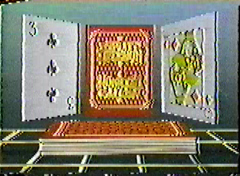 From cheesy 80's game show animation land, it's Split Decision. |
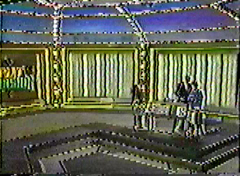 A wide shot of The Price is Right-esque set. |
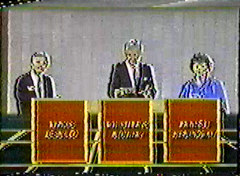 Jim McKrell asks a question. |
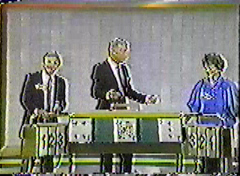 And the first set of cards are laid out. |
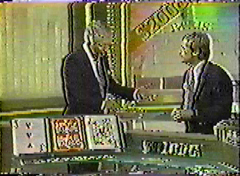 Shot of the first set of cards from the bonus game. |
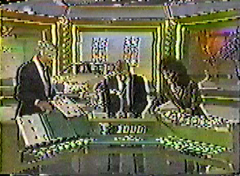 The first Pot Limit hand was a winner, so the chip girl pays off. |
This pilot has been viewed 14349 times since October 6, 2008 and was last modified on Dec 12, 2009 14:46 ET
Feedback? Contact me at usgs-pilot at the usgameshows dot net domain